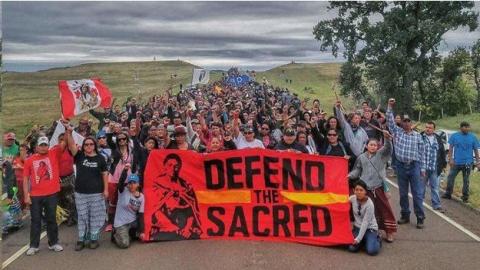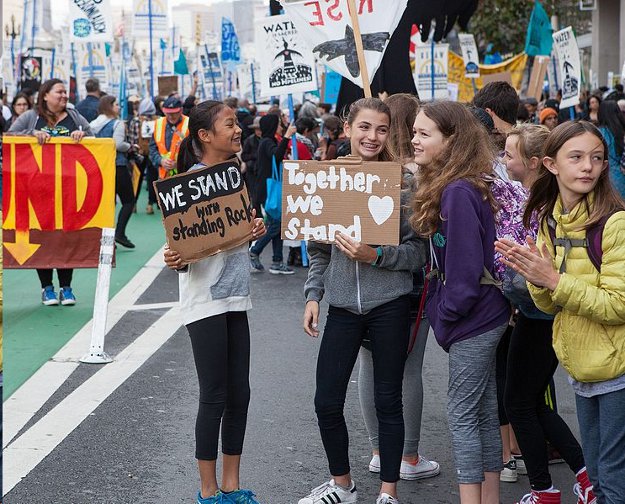A Show of Support for Standing Rock Protestors

Cannonball River, North Dakota—Thousands of U.S. military veterans and first responders are arriving in Lakota Treaty territory to support the Standing Rock Sioux Tribe and Oceti Sakowin (Seven Council Fires) peaceful protests to stop the Dakota Access Pipeline. An estimated 2,000 veterans are expected, but that number is growing as caravans of veterans continue roll in from throughout the nation.
Welcomed on site by Native veterans from many tribes and Lakota elders and youth, veterans are joining more than 11,000 water protectors camped along the Cannonball River who have gathered to protect their water supply, sacred cultural sites and burial grounds from further destruction by DAPL. In recent months, DAPL workers bulldozed irreplaceable sacred sites and burial grounds after court documents revealed their location; some compared this action akin to bulldozing Arlington Cemetery.
Veterans began arriving last week to prepare for events on December 4 and 5 after Wes Clark Jr. and Michael Wood Jr. put out the call to veterans nationwide to deploy to Standing Rock to “protect and serve” American citizens whose Constitutional rights are being violated.
Clark, an Army veteran, screenwriter and activist who served as First Lt. in the cavalry, and Michael Wood Jr., a retired Baltimore cop and Marine veteran, said they are looking forward to Oceti Sakowin elders performing a ceremony to cleanse their spirits and prepare them for the days ahead. Dressed in uniform, veterans will form up into platoons and companies, transitioning into one massive line of protection.
“We are committed to peace and non-violence. We are self-organizing this. I’m not a leader; I’m not in charge. I’m going for religious reasons,” said Clark, who decided to take action after an elder from Standing Rock called him about the protests. “When she described what was happening it brought memories of hearing the gospels in church as a child, the idea that ‘what you do to the least of my brothers you do to me.’”
Other veterans echoed Clark’s words.
"The militarized police paid for by tax dollars is unconstitutional," said Ashleigh Jennifer Parker, a Coast Guard veteran and spokeswoman for Veterans Stand for Standing Rock. "People are being brutalized; concussion grenades are being thrown into crowds. They're spraying people, even old women, and other elders of the tribe with tear gas and pepper spray. All of this is just unconstitutional. I can't believe the media hasn't taken more of an interest in this.”
Parker said the veterans plan to set up on December 4 and will stay at least through December 7, with some planning to remain indefinitely to help.
"No group in the country has served a greater percentage in US military than Native Americans," says Wood. "We need to support them." It should be noted that the order for the veteran’s action calls for no alcohol, no drugs, no weapons, according to requirements established by the SRST and camp leadership.
Last week, North Dakota Governor Jack Dalrymple threatened to cut off supplies to those camped in the midst of a blizzard and ordered an evacuation of families from the Oceti Sakowin and other camps on December 5. However, the state lacks jurisdiction on federal land. Meanwhile, Attorney General Loretta Lynch promised to send federal monitors to ensure citizen’s rights are protected.
On November 25, the Army Corp of Engineers sent a letter to Standing Rock Sioux Tribe Chairman Dave Archambault II stating it planned to close federal property north of Cannonball River on December 5, including the current location of the Oceti Sakowin camp. Anyone who camped beyond that date would be considered trespassing and subject to prosecution, the letter said. However, the Army Corps of Engineers later clarified it would not force anyone to move.
Peaceful resistance and prayer have been ongoing since April 2016. In numerous incidents since then, water protectors were confronted with well-documented violence and militarized local law enforcement, including the use of attack dogs by DAPL security guards. More than 450 people have been arrested on felony charges while their cars and property were confiscated; many of those charges were later reduced or dropped.
Scores of citizens have been beaten with batons, shot with large rubber bullets, pepper-sprayed, blasted with water cannons in sub-zero temperatures, and dragged from ceremonies and arrested for praying on Treaty land. Two women were seriously injured; one by a concussion grenade that shredded her arm and, in a separate incident the other lost vision in one eye after shrapnel damaged her retina.
Native veterans at the camps have made their presence felt since Veterans Day. Army vet Zhooniya Ogitchida said he chose to walk alone to Backwater Bridge to speak to law enforcement on December 2. "I walked up to the frontline wearing my uniform with my Sergeant rank, my name tape, U.S. Army patch and flag. Behind me were hundreds and hundreds of water protectors,” Ogitchida recounted. “I wanted to walk up alone and as I did, they began to take their positions. Some Sheriff's captain and a few other officers came to greet me. I stood on top of a concrete barrier, looked at all of the officers behind concertina razor wire and the wet, abandoned clothes of water protectors who were attacked by water cannons, concussion grenades and rubber bullets.

“I told them, ‘I am a 10-year, two-time war veteran. I am not a protestor, I am an Ogitchida, a warrior. I am here to protect these people from you. I am a defender of the Constitution. I came to see this for myself. I saw the rubber bullets, I saw the gas, I saw the attack dogs. I saw the water cannons used in freezing temperatures. I saw the riot gear and the violence inflicted on so many U.S. citizens.
“ 'I see how you've been mistreating my people.
" 'I am the first of many warriors to come. If you're going to shoot rubber bullets, shoot them at me, at this uniform.’ Then what looked liked a thousand water protectors came walking up behind me. We prayed and then peacefully turned away.”
The Dakota Access Pipeline is a 3.7 billion dollar pipeline that would carry approximately 470,000 barrels of crude oil a day through North Dakota, South Dakota, Iowa and Illinois. Opponents say that the pipeline will have extreme environmental impacts, including serious water contamination and greenhouse emissions.
In a recent visit to Standing Rock, Robert Kennedy Jr. said, “This project is going to create more greenhouse gas than 29 coal plants and it is going to disrupt 209 water bodies.”
Once the pipeline, originally routed north of Bismarck, was viewed as a threat to the city's water supply Energy Transfer Partners subsequently moved the route to land adjacent to the Standing Rock Sioux Tribe. Its path cuts across unceded Treaty land, and this re-routing has led to charges of environmental racism. Additionally, the Missouri River provides water to more than 18 million citizens downstream, including other Lakota reservations.
DAPL runs through Standing Rock Sioux homelands as defined by the 1868 Treaty of Fort Laramie, signed by bands of the Great Sioux Nation and the United States. All of the Lakota tribal nations and hundreds of others oppose the construction of the pipeline and support the Standing Rock Sioux Tribe’s lawsuit against the U.S. Army Corp of Engineers to deny the pipeline an easement under the river.
The coalition of more than 320 Indian nations, has drawn millions of supporters worldwide, and thousands of people who have travelled to Standing Rock as a show of force.
Musicians Jackson Browe and Bonnie Raitt held a benefit concert on November 27 that generated in donations to the Standing Rock Sioux Tribe while other celebrities spoke out in support. Such high-profile activists as Academy Award-nominated actor Mark Ruffalo (The Avengers, Spotlight), Academy Award winning actress Patricia Arquette (Boyhood, Medium) folk icon Joan Baez, environmental expert Robert Kennedy Jr. (Waterkeeper Alliance), civil rights leader Rev. Jesse Jackson, Academy Award-winning actress Jane Fonda (Coming Home, Klute, Grace and Frankie) and Academy Award-nominated actress Shailene Woodley (The Divergent series, The Fault in Our Stars) have all spoken out repeatedly to support the Lakota’s rights; Woodley was arrested in October after leaving a peaceful protest.
“I signed up in 2000 to serve my country. Whether I’m in [the military] or whether I’m out, I’m here, serving my people,” said Brandee Paisano, a Laguna Pueblo veteran of the Navy. “And it’s not just my Native people, it’s everybody who lives in this country and you can’t ever let that oath die. That’s why I’m here.”
From Indian Country News and republished by our content partner New America Media




























































































































































































































































































































